Young athletes often face anxiety due to performance pressure, fear of failure, and social dynamics. Understanding these causes is essential for developing effective coping mechanisms. Techniques such as deep breathing, visualization, and mindfulness can help manage anxiety. Additionally, fostering open communication with coaches and parents enhances emotional support and resilience.
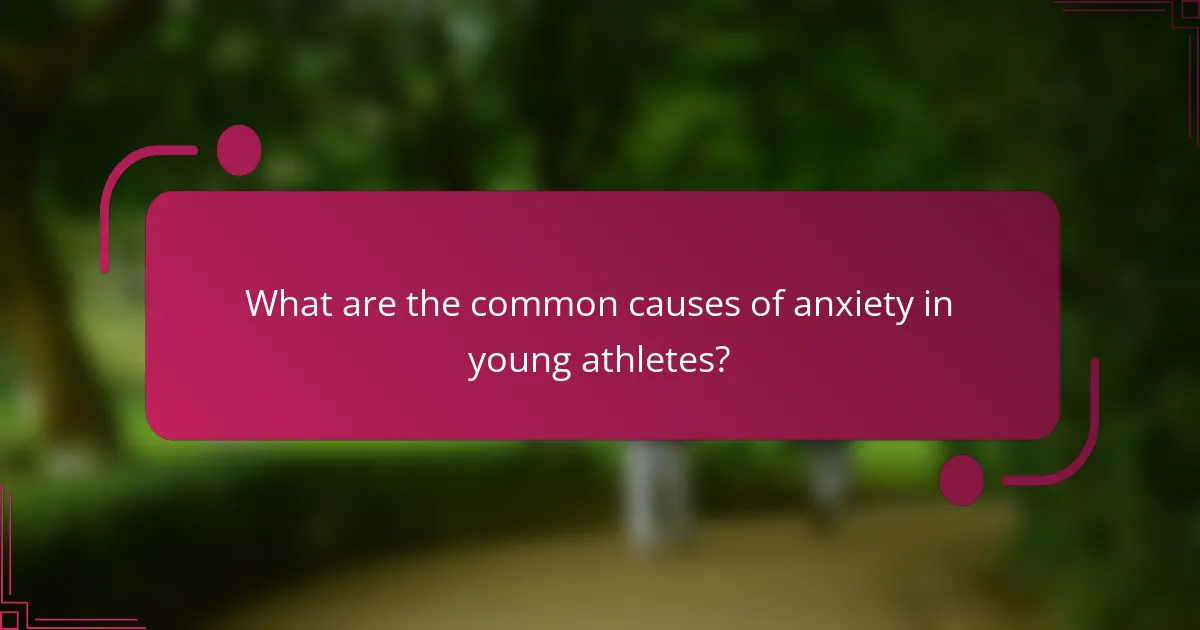
What are the common causes of anxiety in young athletes?
Common causes of anxiety in young athletes include performance pressure, fear of failure, and parental expectations. These factors can create overwhelming stress, affecting their mental health and athletic performance. Additionally, social dynamics, such as competition with peers and the desire for acceptance, contribute to anxiety levels. Understanding these causes is crucial for developing effective coping mechanisms.
How does performance pressure contribute to anxiety?
Performance pressure significantly contributes to anxiety in young athletes by heightening their stress levels and fear of failure. This pressure can stem from expectations set by coaches, parents, and peers. As a result, young athletes may experience increased heart rate, negative self-talk, and a lack of focus. Recognising and addressing these pressures through effective coping mechanisms can help athletes manage anxiety and improve performance. Techniques such as mindfulness, positive visualization, and stress management strategies are essential for fostering resilience in competitive environments.
What role do parental expectations play in anxiety levels?
Parental expectations significantly impact anxiety levels in young athletes. High expectations can create pressure, leading to increased stress and anxiety. Studies show that athletes with supportive parents experience lower anxiety levels. Conversely, unrealistic expectations can hinder performance and enjoyment of the sport. Encouraging open communication and realistic goal-setting can mitigate these effects, fostering a healthier athletic environment.
How does competition impact mental health in young athletes?
Competition can negatively impact mental health in young athletes by increasing anxiety levels. Young athletes often face pressure to perform, leading to stress and fear of failure. Effective coping mechanisms include mindfulness techniques, positive self-talk, and seeking support from coaches and peers. Research indicates that athletes who develop strong coping strategies can better manage competition-related anxiety. Encouraging open conversations about mental health can also foster resilience and improve overall well-being in young athletes.
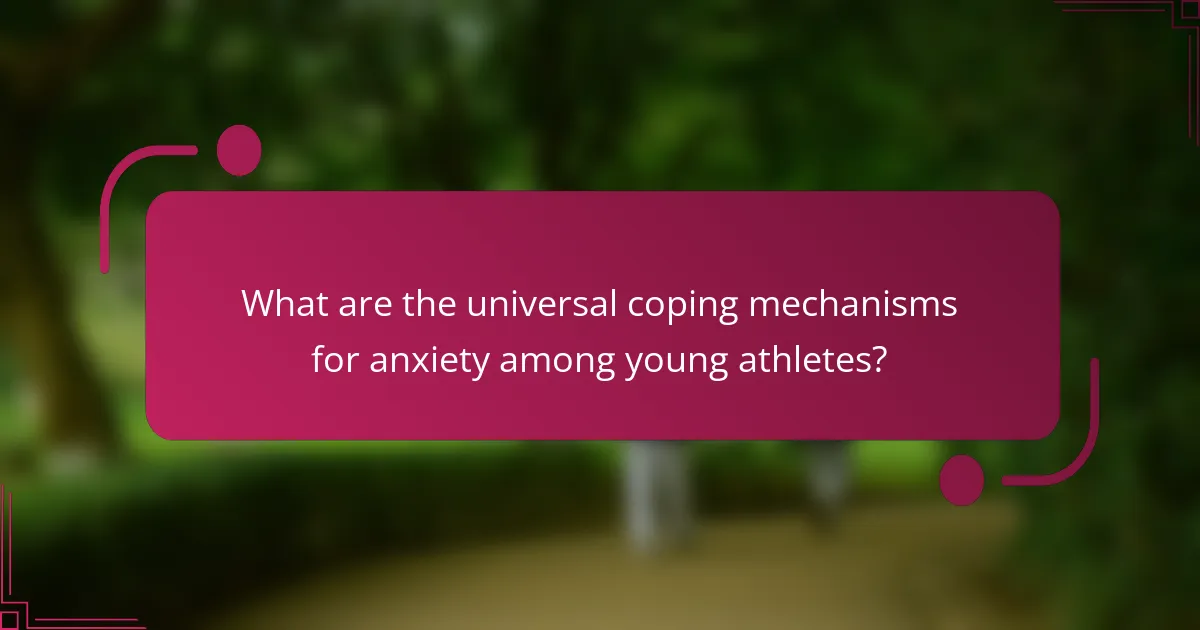
What are the universal coping mechanisms for anxiety among young athletes?
Young athletes can effectively manage anxiety through various coping mechanisms. These include deep breathing exercises, visualization techniques, and maintaining a consistent routine.
Deep breathing helps calm the nervous system, while visualization allows athletes to mentally rehearse success. A consistent routine fosters a sense of control and predictability, reducing anxiety levels.
Additionally, physical activity serves as a natural stress reliever, promoting overall well-being. Engaging in conversations with coaches or peers can provide emotional support and perspective.
Mindfulness practices, such as meditation, can enhance focus and reduce anxiety symptoms. These coping strategies collectively empower young athletes to navigate their emotional challenges effectively.
How can physical activity serve as a coping strategy?
Physical activity can effectively serve as a coping strategy for anxiety in young athletes by providing a constructive outlet for stress. Engaging in sports fosters social connections, promotes self-esteem, and releases endorphins, which enhance mood. Research indicates that regular exercise can significantly reduce anxiety symptoms, making it a valuable tool for mental health. Additionally, physical activity helps establish routine and discipline, offering a sense of control amid life’s challenges.
What role does social support play in managing anxiety?
Social support significantly reduces anxiety in young athletes by providing emotional reassurance and practical assistance. Friends, family, and teammates can create a sense of belonging, which enhances coping strategies. Research shows that athletes with strong social networks experience lower anxiety levels and improved performance. Engaging in team activities fosters connections, enabling athletes to share experiences and feelings, which can alleviate stress.
How can goal-setting help alleviate anxiety?
Goal-setting can significantly alleviate anxiety in young athletes by providing structure and focus. Setting specific, measurable, achievable, relevant, and time-bound (SMART) goals helps athletes concentrate on their performance rather than their worries. This process fosters a sense of control and accomplishment, reducing feelings of uncertainty. Research indicates that goal-setting enhances motivation and self-confidence, essential attributes for managing anxiety effectively. As a result, young athletes can channel their energy into achieving their objectives, leading to improved mental well-being.
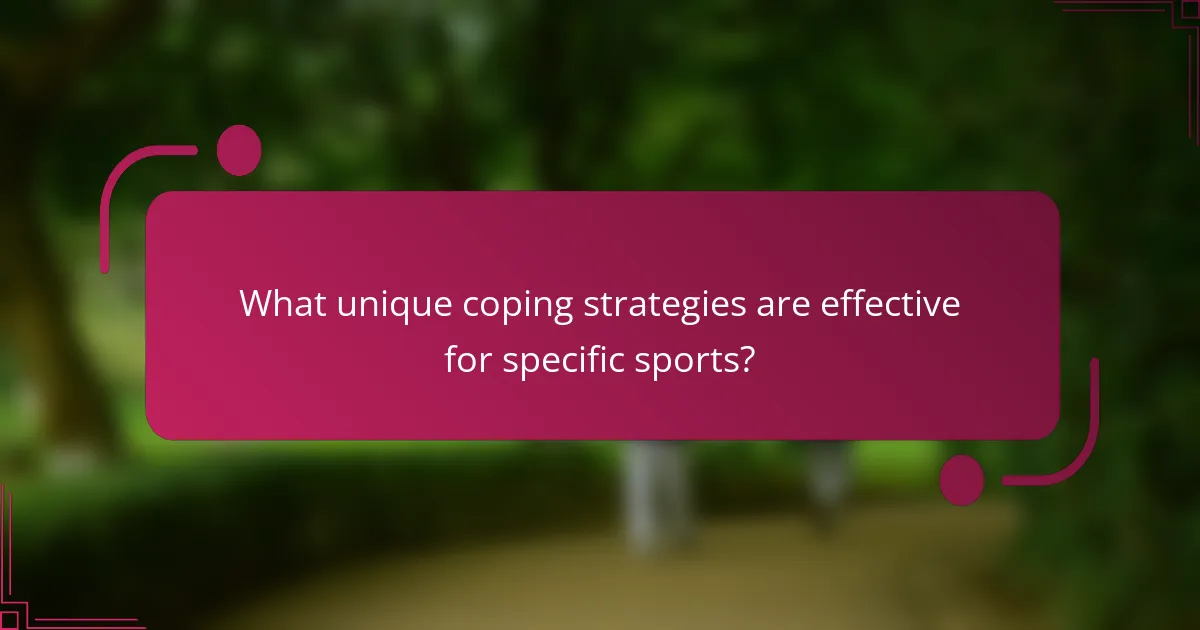
What unique coping strategies are effective for specific sports?
Effective coping strategies for specific sports include visualization techniques, breathing exercises, and mindfulness practices. These methods help young athletes manage anxiety during competition.
For example, visualization allows athletes to mentally rehearse performances, enhancing confidence. Breathing exercises promote relaxation and focus, reducing physiological symptoms of anxiety. Mindfulness practices encourage present-moment awareness, helping athletes stay grounded amid pressure.
Unique attributes of these strategies include their adaptability across various sports. Visualization is particularly effective in sports requiring precision, like gymnastics. Breathing exercises benefit endurance athletes by improving oxygen flow. Mindfulness can enhance focus in team sports, fostering better communication and teamwork.
How do team sports differ from individual sports in coping strategies?
Team sports often provide more social support and shared coping strategies than individual sports. Young athletes in team settings can rely on teammates for emotional backing, which enhances resilience against anxiety. In contrast, individual sports may require athletes to develop personal coping mechanisms, leading to unique challenges. Research shows that team dynamics foster a sense of belonging, promoting better mental health outcomes. Conversely, individual athletes may experience isolation, impacting their ability to manage anxiety effectively.
What unique techniques do young athletes in high-pressure sports utilize?
Young athletes in high-pressure sports utilize unique techniques to manage anxiety effectively. These methods include visualization, mindfulness, and controlled breathing.
Visualization helps athletes mentally rehearse performances, enhancing confidence and focus. Mindfulness practices enable them to stay present, reducing anxiety about future outcomes. Controlled breathing techniques regulate physiological responses, promoting calmness under pressure.
Incorporating these strategies can significantly improve performance and emotional resilience, allowing young athletes to thrive in competitive environments.

What rare coping mechanisms can be beneficial for young athletes?
Rare coping mechanisms can significantly aid young athletes in managing anxiety. Techniques such as visualization, where athletes mentally rehearse performances, can enhance focus and reduce stress. Another unique strategy is the use of biofeedback, which helps athletes gain awareness of physiological responses, enabling them to regulate anxiety levels. Mindfulness meditation, a rare attribute among coping strategies, promotes present-moment awareness and emotional regulation. Engaging in creative expression, like art or music, can also serve as a therapeutic outlet for emotions. These approaches provide young athletes with diverse tools to navigate anxiety effectively.
How can creative expression serve as an anxiety outlet?
Creative expression serves as an effective anxiety outlet for young athletes by providing a safe space for emotions. Engaging in activities like painting, writing, or music allows them to process feelings and reduce stress. Research shows that creative outlets can lower cortisol levels, promoting relaxation and mental clarity. Additionally, these activities foster a sense of achievement, enhancing self-esteem and resilience. Young athletes benefit from expressing their unique perspectives, which can lead to improved mental health and overall performance.
What role does visualization play in reducing anxiety?
Visualization significantly helps reduce anxiety in young athletes by promoting mental clarity and focus. By imagining successful performances, athletes can create a positive mindset that diminishes fear and stress. This technique enhances confidence and prepares them for real-life scenarios. Research shows that mental imagery can lower physiological symptoms of anxiety, such as heart rate and muscle tension, contributing to improved performance. Visualization serves as a unique coping mechanism, allowing athletes to mentally rehearse and feel more in control during competitions.
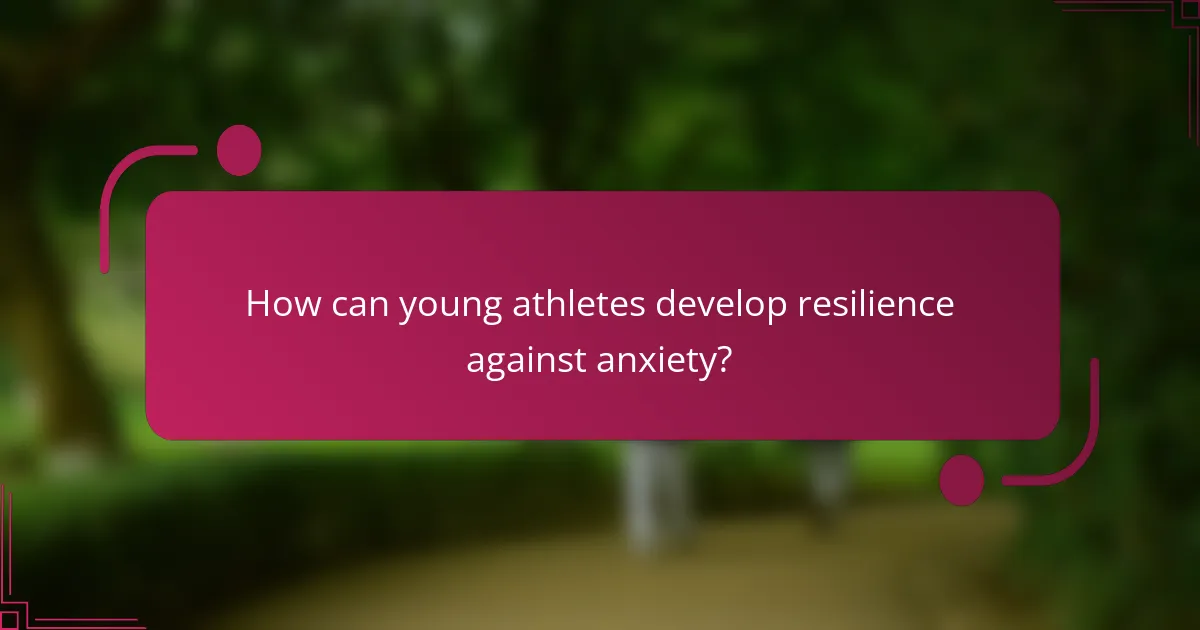
How can young athletes develop resilience against anxiety?
Young athletes can develop resilience against anxiety through effective coping mechanisms. Techniques such as mindfulness, positive self-talk, and structured routines significantly enhance mental toughness.
Mindfulness practices, including meditation and deep breathing, help athletes stay present and manage stress. Positive self-talk fosters a supportive inner dialogue, countering negative thoughts. Structured routines provide predictability, reducing anxiety during competitions.
Research indicates that athletes who engage in these practices report lower anxiety levels and improved performance. By consistently applying these strategies, young athletes can build resilience and thrive under pressure.
What are practical steps to build mental toughness?
To build mental toughness, young athletes should adopt practical coping mechanisms for anxiety. These include setting realistic goals, practicing mindfulness, maintaining positive self-talk, and developing a consistent routine.
1. Set realistic goals: Break down larger objectives into achievable steps to foster a sense of accomplishment.
2. Practice mindfulness: Engage in techniques like deep breathing or meditation to enhance focus and reduce anxiety.
3. Maintain positive self-talk: Replace negative thoughts with affirmations to boost confidence and resilience.
4. Develop a consistent routine: Establishing a structured training and recovery schedule can provide stability and predictability.
These strategies can enhance mental toughness, enabling young athletes to perform better under pressure.
How can young athletes learn from setbacks to cope better?
Young athletes can learn from setbacks by developing resilience and adaptive coping strategies. Emphasising a growth mindset helps them view challenges as opportunities for improvement. Techniques such as mindfulness and positive self-talk can enhance emotional regulation. Additionally, seeking support from coaches and peers fosters a sense of community, making it easier to navigate difficulties. Engaging in reflective practices, like journaling, allows athletes to process experiences and identify lessons learned, ultimately strengthening their coping mechanisms for future challenges.
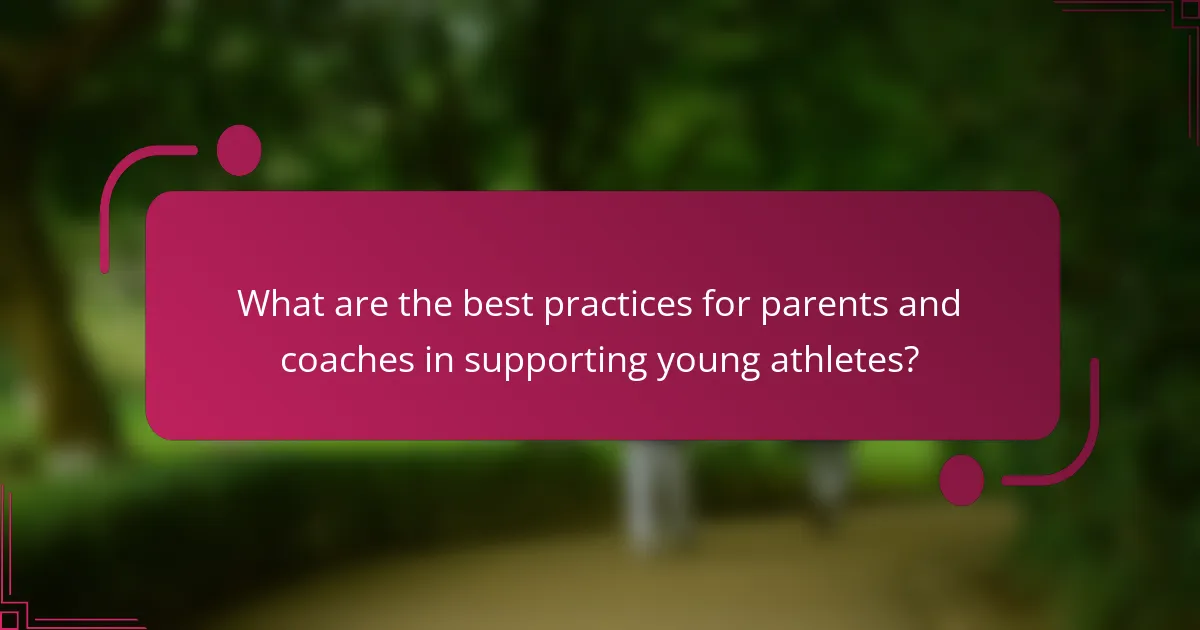
What are the best practices for parents and coaches in supporting young athletes?
To support young athletes coping with anxiety, parents and coaches should prioritise open communication, emotional validation, and structured routines. Establishing a trusting environment encourages athletes to express their feelings without fear of judgment.
Encouraging relaxation techniques, such as deep breathing or visualization, can help manage anxiety symptoms. Coaches should also promote a focus on personal growth rather than solely on performance outcomes. This approach fosters resilience and a positive mindset.
Regular check-ins and feedback sessions can help athletes feel supported and understood. Parents should model healthy coping strategies, demonstrating how to handle stress effectively.
Ultimately, a collaborative effort between parents and coaches can create a nurturing atmosphere that empowers young athletes to navigate their anxiety successfully.
How can communication improve coping mechanisms?
Effective communication enhances coping mechanisms for anxiety in young athletes by fostering a supportive environment. Open dialogue allows athletes to express their feelings, reducing feelings of isolation. Sharing experiences with peers can lead to collective problem-solving, which strengthens resilience. Additionally, guidance from coaches and mentors can provide valuable coping strategies tailored to individual needs. This holistic approach empowers athletes to manage anxiety effectively, ultimately improving their performance and well-being.
What strategies can be implemented to create a supportive environment?
Creating a supportive environment for young athletes involves implementing several strategies. First, foster open communication to allow athletes to express their feelings and concerns. Second, provide access to mental health resources, including counselling and workshops on coping mechanisms. Third, encourage teamwork and camaraderie to build a sense of belonging. Lastly, promote a balanced approach to competition, emphasizing personal growth over winning. These strategies can significantly enhance the mental well-being of young athletes.
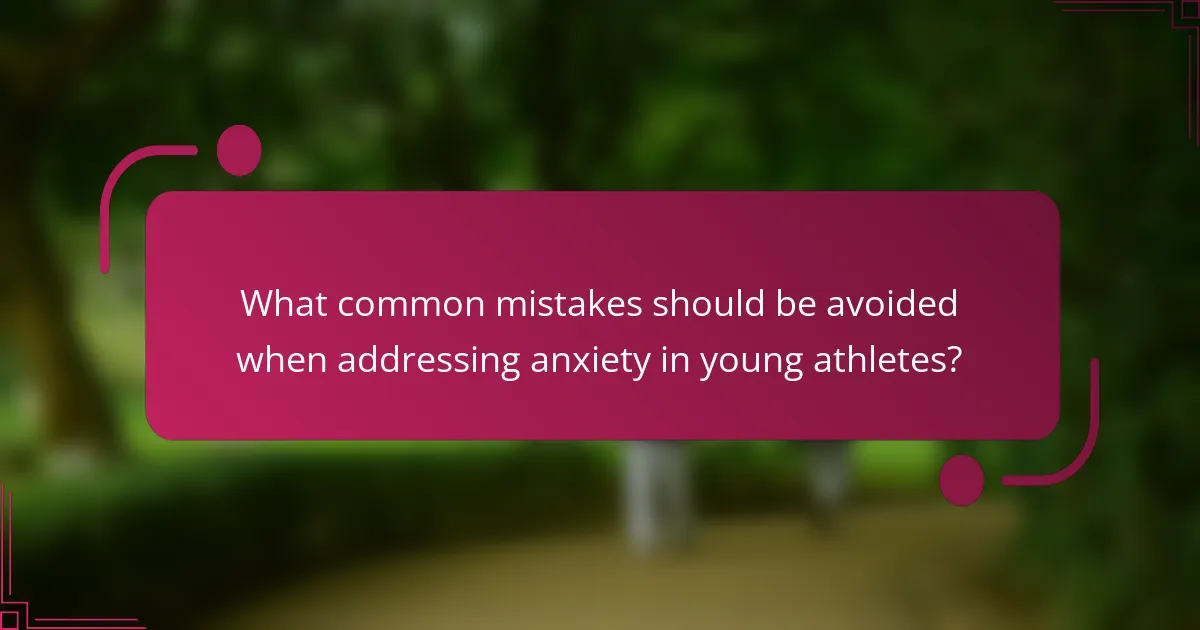
What common mistakes should be avoided when addressing anxiety in young athletes?
Young athletes should avoid common mistakes like dismissing their feelings, overemphasizing performance, and neglecting communication. These errors can exacerbate anxiety and hinder coping strategies.
Ignoring emotional signals can lead to increased stress. Athletes may feel pressured to perform, which can worsen anxiety. Open communication with coaches and parents is crucial for support.
Additionally, relying solely on self-help techniques without professional guidance may limit effectiveness. A balanced approach that includes mental health resources can provide better coping mechanisms.
Finally, overlooking the importance of rest and recovery can contribute to heightened anxiety levels. Prioritising mental well-being alongside physical training is essential for young athletes.
How can overemphasis on winning exacerbate anxiety?
Overemphasis on winning can significantly heighten anxiety in young athletes. This pressure to succeed may lead to fear of failure, impacting performance and enjoyment. Athletes may experience heightened stress levels, which can manifest as physical symptoms like increased heart rate or mental fatigue.
Fostering a balanced perspective on competition is essential. Encouraging athletes to focus on personal growth and teamwork can mitigate anxiety. Implementing coping strategies such as mindfulness and positive self-talk can help young athletes manage their emotions effectively.
Ultimately, prioritising mental well-being over winning can create a healthier sports environment. This approach supports athletes in developing resilience, promoting long-term enjoyment and participation in sports.
What should be avoided in discussions about performance and anxiety?
Avoid discussing performance in a way that amplifies anxiety or pressure on young athletes. Focus on supportive strategies and positive reinforcement instead. Criticism, comparisons to others, and unrealistic expectations can exacerbate anxiety. Emphasising enjoyment and personal growth fosters a healthier mindset.

What expert insights can enhance coping strategies for anxiety?
Expert insights can significantly enhance coping strategies for anxiety in young athletes. Techniques such as mindfulness training, cognitive behavioural strategies, and physical conditioning are effective. Mindfulness helps athletes stay present, reducing anxiety during competition. Cognitive behavioural strategies focus on reframing negative thoughts, fostering resilience. Physical conditioning not only improves performance but also boosts confidence, reducing anxiety levels. Engaging in regular conversations with coaches and sports psychologists can provide additional support and enhance coping mechanisms.
What recommendations do sports psychologists offer for young athletes?
Sports psychologists recommend several coping mechanisms for young athletes to manage anxiety effectively. Techniques include deep breathing exercises, visualization strategies, and positive self-talk. These methods help athletes focus, reduce stress, and enhance performance. Additionally, maintaining a balanced routine that incorporates physical activity, relaxation, and social support can significantly improve mental resilience. Engaging in mindfulness practices is also beneficial, fostering awareness and control over anxious thoughts.
How can workshops and training improve coping skills?
Workshops and training can significantly enhance coping skills for young athletes facing anxiety. They provide structured environments for learning effective strategies and techniques.
Participating in these programs fosters resilience by teaching athletes to recognize stressors and develop personalized coping mechanisms. For example, mindfulness training can improve focus and reduce anxiety during competitions.
Additionally, workshops often encourage peer support, creating a community where athletes share experiences and strategies. This social aspect can enhance motivation and reinforce learned skills.
Finally, continuous practice in workshops allows athletes to refine their coping strategies, making them more effective under pressure.